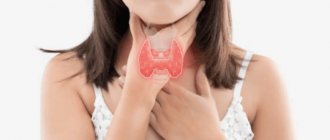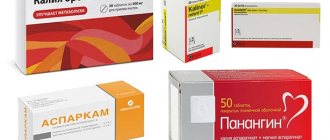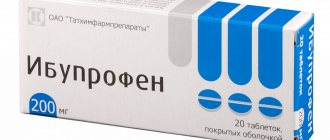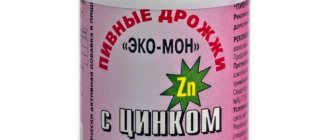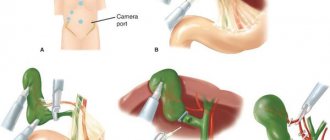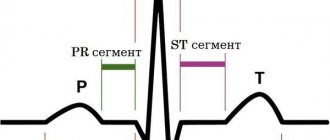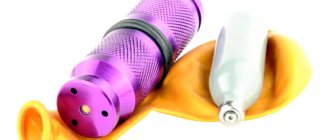Photo: koffkindom. ru
Photo: koffkindom. ru
— There have been active advertisements of iodine preparations on TV for many years. I heard that it is simply necessary for residents of the Amur region. And at an appointment with my friend, an endocrinologist told me that since she was over 40 years old, she couldn’t take iodine tablets. Why? - asked Tatyana Ustinova from Blagoveshchensk.
Elvira Sayutina, an endocrinologist of the highest category at Blagoveshchensk City Clinical Hospital, answers:
— Iodine preparations must be taken. But! Firstly, tableted iodine is for young people - up to 40 years old. After 40, taking it may be fraught. If a person has been drinking iodine tablets since the age of 20, everything is fine; when he turns 40, let him continue drinking. But if at the age of 43 a person suddenly gets the idea: should I somehow influence the thyroid gland, then it’s not worth doing.
Iodine preparations should be prescribed for preventive purposes to young healthy people, children, adolescents, pregnant and lactating women. These are people whose need for iodine is very high at the moment.
Doctors recommend that Amur residents over 40 years old eat foods rich in iodine.
Let me also remind you that iodine preparations should also be prescribed by a doctor - an endocrinologist. After all, an excess of iodine, like its lack, is also not good - this is a risk of developing hyperthyroidism, thyrotoxicosis, there is the concept of iodine-induced thyrotoxicosis. And if a person has nodes in the thyroid gland, the question arises: is it necessary, is it indicated to take iodine? To do this, you need to undergo a series of examinations. Let's say a person comes for an appointment - he lives in an endemic area (an area whose residents experience a lack of iodine - AP note), we do him tests for hormones, and he, for example, has a toxic goiter. Iodine supplements are contraindicated for him. Not only will they not bring him any benefit, but they will harm him.
— If iodine in tablets is for people under 40 years old, then after what?
— Foods rich in iodine: seaweed, seafood, sea fish, iodized salt.
What is the meaning of such an age limit: a person lives for 40-45 years in a state of chronic iodine deficiency - this is like what we have in the Amur region. And suddenly he decides to take iodine tablets - regularly, on time. No other organ in the body except the thyroid gland needs iodine. And the thyroid gland, being in a state of chronic iodine deficiency, begins to grab this iodine, grabs it and pulls it on itself out of greed. She stores it, stores it, stores it - in the end this can provoke disorders, hyperfunction of the gland. Everything must be done on time. If it was prescribed to you on time and you started taking it on time, then you can continue after 40 years, provided that your hormones are normal and there are no nodes in the thyroid gland.
Iodine is a serious drug. Remember, there used to be a drug called antistrumin? Small white tablets, delicious. Back in Soviet times, somewhere in central Russia there was a case of children being poisoned with iodine. The teacher came to the class and put a bottle: children, take one of each. One tablet contains a dose of 1000 micrograms, while the daily norm for an adult is 200. Antistrumin was given once a week. And the children - the pills were sweet - ate several of them.
Now iodine comes in micronized doses - one tablet contains the daily dose. You won’t find Antistrumin in Russian pharmacies now.
Age category of materials: 18+
- Amurskaya Pravda from 03/01/2019
Composition per 1 tablet:
Active substance:
potassium iodide - 0.131 mg (corresponding to 0.1 mg of iodine);
Excipients:
lactose monohydrate, magnesium hydroxycarbonate, gelatin, sodium carboxymethyl starch, colloidal silicon dioxide, magnesium stearate.
Description: round flat-cylindrical tablets of white or almost white color, with a chamfer and a score on one side.
Pharmacotherapeutic group: thyroxine synthesis regulator - iodine drug ATC code: H03SA
Pharmacological properties
Pharmacodynamics
Iodine is a vital trace element that is a component of the thyroid hormones - thyroxine and triiodothyronine. Thyroid hormones are involved in the development of all organs and systems, in the regulation of metabolic processes in the body: they are responsible for the exchange of proteins, fats, carbohydrates and energy in the body, regulate the activity of the brain, the nervous and cardiovascular systems of the reproductive and mammary glands, as well as the growth and child development.
Iodine deficiency is especially dangerous for children, adolescents, pregnant and lactating women.
Pharmacokinetics
Suction
When taken orally, potassium iodide is almost completely absorbed in the small intestine.
Distribution
The average volume of distribution for healthy individuals is approximately 23 L (38% of body weight). The normal plasma iodine concentration ranges from 0.1 to 0.5 μg/dL. Accumulates in the thyroid gland, salivary glands, mammary glands and stomach tissues. The concentration in saliva, gastric juice and breast milk is approximately 30 times higher than in blood plasma.
Removal
Excreted by the kidneys, the concentration of iodine in urine relative to creatinine (mcg/g) is an indicator of its intake into the body.
Special instructions for the use of the drug Iodomarin
The drug contains lactose, so it should not be used in cases of congenital galactose intolerance, lactase deficiency or glucose-galactose malabsorption syndrome. Use during pregnancy and lactation. During pregnancy and lactation, the need for iodine is increased, so a sufficient intake of iodine in the body (200 mcg/day) is especially important. Due to the penetration of iodine through the placental barrier and the sensitivity of the fetus to it, the recommended doses should not be exceeded. This requirement also applies to the period of breastfeeding, since the concentration of iodine in milk is 30 times higher than that in blood plasma. An exception is high-dose iodine prophylaxis, which is carried out in case of man-made radioactive contamination. Use in children. The drug can be used in children at any age if indicated. The ability to influence reaction speed when driving vehicles or operating machinery. There is no data on negative effects.
Contraindications
- hypersensitivity to potassium iodide and/or any excipient in the drug;
- manifest hyperthyroidism;
- subclinical hyperthyroidism - in doses exceeding 150 mcg of iodine per day;
- solitary toxic adenomas of the thyroid gland and functional autonomy of the thyroid gland (focal and diffuse), nodular toxic goiter (with the exception of preoperative therapy for the purpose of blocking the thyroid gland);
- lactose intolerance, lactase deficiency, glucose-galactose malabsorption syndrome;
- Dühring's herpetiformis (senile) dermatitis.
The drug should not be used for hypothyroidism, except in cases where the development of the latter is caused by severe iodine deficiency. The use of the drug should be avoided during therapy with radioactive iodine, the presence or suspicion of thyroid cancer.
Do not take Iodomarin®200
If you have an allergy to potassium iodide or any other part of this drug
With a clear increase in thyroid function (there are complaints)
With a hidden increase in thyroid function (no complaints) in doses exceeding 150 mcg of iodine per day
In the presence of a benign hormone-producing tumor, as well as uncontrolled hormone-producing areas of the thyroid gland in a dosage of 300 to 1000 mcg of iodine per day (except for treatment in the preoperative period)
Before taking Iodomarin® 200, consult your doctor or pharmacist
Use during pregnancy and breastfeeding
During pregnancy and breastfeeding, the need for Iodine increases, so it is especially important to use the drug Yodomarin® 100 in sufficient doses to ensure adequate intake of iodine into the body. Potassium iodide passes through the placenta and into breast milk. If a nursing woman takes potassium iodide, additional administration of the drug to breastfed infants is not required.
The use of the drug during pregnancy and breastfeeding is possible only in recommended doses. When carrying out therapy, it is necessary to take into account the amount of iodine supplied with food.
Lack of iodine in the body - what to take?
Iodine plays a huge role in women's health as an essential nutrient for the thyroid, breasts, ovaries, uterus and more. That is why it is necessary to monitor the amount of iodine in the body, since without its participation many processes will be disrupted.
The main sources of iodine include:
- Salt. Iodized salt contains an average of 45 micrograms of iodine per gram. This concentration may vary depending on the manufacturer. For exact quantity information, check the packaging information.
- Food. Iodine is found in seafood, milk, vegetables and fruits. Fish and seaweed are iodine-rich foods—one serving of fish contains about 90 micrograms of iodine, and one serving of seaweed contains about 200 micrograms of iodine.
- Supplements Vitamins and supplements vary in their iodine content. If you are planning or are already using any type of vitamins or supplements, be sure to consult with your healthcare professional. This is necessary so that you can calculate the correct dosage, since excess or deficiency of iodine in the body has its consequences.
Directions for use and doses
When determining the required dose of Yodomarin® 100, regional and individual characteristics of iodine intake from food must be taken into account. This is especially important when prescribing the drug to newborns and children under 4 years of age.
Prevention of iodine deficiency diseases: Newborns and children:
50−100 mcg of iodine per day (1/2 - 1 tablet of the drug Yodomarin® 100);
Adolescents and adults:
100−200 mcg of iodine per day (1−2 tablets of Yodomarin® 100);
During pregnancy and breastfeeding:
100−200 mcg of iodine per day (1−2 tablets of Yodomarin® 100).
Prevention of goiter relapse after its surgical removal or after completion of goiter treatment with thyroid hormone preparations: 100−200 mcg of iodine daily (1−2 tablets of the drug Yodomarin® 100).
Treatment of euthyroid goiter: Newborns and children:
100−200 mcg of iodine per day (1−2 tablets of the drug Yodomarin® 100);
Adolescents and young adult patients:
200 mcg of iodine per day (2 tablets of Iodomarin® 100).
The daily dose of the drug should be taken in one dose, after meals, with a sufficient amount of liquid. When prescribing the drug to newborns and children under 3 years of age, it is recommended to dissolve the tablet in a small amount (1 tablespoon) of boiled water at room temperature.
The use of the drug for prophylactic purposes is carried out for, as a rule, several months or years, and often throughout life.
For the treatment of goiter in newborns, in most cases, 2-4 weeks are sufficient; in children, adolescents and adults it usually takes 6−12 months or more.
The duration of treatment is determined by the doctor.
Use of the drug Iodomarin
The drug is taken after meals with a sufficient amount of liquid. For infants, the drug is mixed with food. Prophylactic use of the drug must be carried out for several years, and often throughout life. Treatment of goiter in newborns usually requires 2–4 weeks, and in children, adolescents and adults it usually takes ≥6–12 months. The issue of dosage and duration of use of the drug Iodomarin 100 is decided on an individual basis. Prevention of iodine deficiency and endemic goiter (in cases where the intake of iodine into the body is less than 150–200 mcg per day): infants and older: 1/2–1 tablet of Iodomarin 100 (50–100 mcg of iodine per day); adolescents and adults: 1–2 tablets of Iodomarin 100 (100–200 mcg of iodine per day); period of pregnancy and breastfeeding: 2 tablets of Iodomarin 100 (200 mcg of iodine per day). Prevention of relapses after surgery for euthyroid goiter or its drug treatment Children and adults: 1-2 tablets of Iodomarin 100 (100-200 mcg of iodine per day). These recommendations are of a general nature and in each case it is necessary to take into account the daily amount of iodine entering the body with food. Recommendations regarding dosage are also valid for further treatment after the end of therapy for euthyroid goiter with levothyroxine. Treatment of euthyroid goiter: infants - adolescents: 1-2 tablets of Iodomarin 100 (100-200 mcg of iodine per day); adults: 3–5 tablets of Iodomarin 100 (300–500 mcg of iodine per day).
Overdose
Symptoms:
staining of the mucous membranes brown, reflex vomiting (if there are starch-containing components in the food, the vomit becomes blue), abdominal pain and diarrhea (blood may be present in the stool). In severe cases, dehydration and shock may develop. In rare cases, esophageal stenosis has occurred. Cases of death were observed only after taking large amounts of iodine (30-250 ml of iodine tincture).
In rare cases, long-term overdose of potassium iodide can lead to the development of so-called “iodism”, i.e. iodine intoxication: metallic taste in the mouth, swelling and irritation of the mucous membranes (runny nose, conjunctivitis, gastroenteritis, bronchitis). Potassium iodide can activate latent inflammatory processes such as tuberculosis. Possible development of edema, erythema, acne-like and bullous rash, hemorrhage, fever and irritability.
Treatment for acute intoxication:
gastric lavage with a solution of starch, protein or 5% sodium thiosulfate solution until all traces of iodine are removed. Symptomatic treatment of water-electrolyte imbalances, anti-shock therapy.
Treatment for chronic intoxication:
withdrawal of potassium iodide.
Treatment of iodine-induced hypothyroidism:
abolition of potassium iodide, normalization of metabolism with the help of thyroid hormones.
Treatment of iodine-induced thyrotoxicosis:
for mild forms of treatment is not required; in severe forms, thyreostatic therapy is required (the effect of which is always delayed). In severe cases (thyrotoxic crisis), intensive therapy, plasmapheresis or thyroidectomy are necessary.
In the case of hyperthyroidism, we cannot talk about an overdose as such, since hyperthyroidism can be caused by an amount of iodine that is normal in other countries.
If you stop taking Iodomarin®200
If you stop taking Iodomarin® 200, for example due to side effects, tell your doctor.
If you have any further questions about taking this drug, ask your doctor or pharmacist.
Possible side effects
Like all medicines, this drug may cause side effects, which, however, may not occur in all patients.
With the prophylactic use of iodide at any age, as well as with therapeutic use in newborns, children and adolescents, as a rule, no undesirable effects are observed. However, in the presence of extensive uncontrolled hormone-forming areas of thyroid autonomy and the administration of iodine in daily doses exceeding 150 mcg, it is impossible to completely eliminate the clinical manifestations of increased thyroid function.
Very rare: (less than 1 in 10,000 patients)
Immune system disorders
Hypersensitivity reactions, such as iodine-induced rhinitis, skin reactions (bullous and tuberous iododerma, exfoliative dermatitis), swelling of the skin or mucous membranes (angioedema), fever, acne and swelling of the salivary glands.
Disorders of the hormonal system
When used for the treatment of goiter in adults (daily dosage from 300 to 1000 mcg of iodine), in some cases it is possible to increase the function of the thyroid gland caused by iodine. In the vast majority of cases, a prerequisite for this is the presence of hormone-producing foci in the thyroid gland. Elderly patients who have had goiter for a long time are usually at risk.
If any side effects occur, contact your doctor or pharmacist. This applies to any possible side effects, including those not described in this leaflet.
Contraindications
Iodomarin®200 should not be used for:
- a history of hypersensitivity to the active substance or to one of the other components of the drug presented in the excipients
- manifest hyperthyroidism
- latent hyperthyroidism in doses exceeding 150 mcg of iodine per day
-autonomous adenoma, as well as focal and diffuse foci of autonomy of the thyroid gland in a dosage of 300 to 1000 mcg iodine daily (with the exception of preoperative blockade of the thyroid gland according to Plummer).
How to store Iodomarin®200
Keep out of the reach of children
Store at a temperature not exceeding 25°C
Do not use this medicine after the expiration date which is indicated on the outer packaging and on the blister after the words “Best before”. The expiration date is considered to be the last day of the specified month.
Do not dispose of any medications down the drain or in household waste. Consult your pharmacy regarding how to dispose of unwanted medicine. Ethimers help protect the environment.
Iodomarin® 200 is available in packages of 100 tablets (blister).
Interaction with other drugs
Iodine deficiency increases, and iodine excess decreases, the effectiveness of hyperthyroidism treatment with antithyroid drugs. Therefore, before or during treatment for hyperthyroidism, it is recommended to avoid any iodine intake if possible. On the other hand, antithyroid drugs inhibit the conversion of iodine into an organic compound in the thyroid gland and, thus, can cause the formation of goiter.
Substances that enter the thyroid gland through the same mechanism as iodides can compete with iodine and inhibit its uptake by the thyroid gland (for example, perchlorate, which also inhibits the recycling of iodides within the thyroid gland). Iodine absorption may also be reduced when using drugs that do not themselves enter the thyroid gland, for example, thiocyanate in concentrations exceeding 5 mg/dl.
Iodine uptake by the thyroid gland and its metabolism are stimulated by endogenous and exogenously administered thyroid-stimulating hormone (TSH).
Simultaneous treatment with high doses of iodine and lithium salts can contribute to the occurrence of goiter and hypothyroidism. High doses of potassium iodide in combination with potassium-sparing diuretics can lead to hyperkalemia.
Signs of iodine deficiency in a woman’s body
Unfortunately, almost a third of the world's population is at risk of iodine deficiency. Those most at risk include:
- Pregnant women.
- People who live in countries where there is very little iodine in the soil.
- People who do not consume iodized salt.
- People following a vegetarian or vegan diet.
Other symptoms of iodine deficiency in women include: brittle nails, coarsening and thinning hair, puffy eyes, pale, dry skin, weakness and constipation.
Symptoms that appear later in the course of the disease include hoarseness; menstrual irregularities; swelling of the hands, face and legs; thickening of the skin; thinning eyebrows; elevated cholesterol levels; muscle and/or joint pain and stiffness; slow speech and hearing loss.
Iodine deficiency in more serious situations can worsen breast condition and disrupt the balance of the reproductive system . Lack of iodine increases the risk of fibrocystic breast disease, which affects up to 50% of women of reproductive age, but fortunately, iodine supplements have been shown to be beneficial in treating this condition. If you have lumpiness or discomfort in one or both breasts, you should see a doctor immediately to determine the cause and treatment.
In addition to its role in breast health, iodine is also essential for women's reproductive health, being essential for ovulation, progesterone production and estrogen metabolism. Its deficiency can disrupt hormonal processes, which negatively affects the overall background. From a clinical perspective, iodine is especially beneficial for some women who experience unpleasant symptoms in the second half of their menstrual cycle, such as premenstrual breast tenderness, low progesterone and PMS.
special instructions
It should be taken into account that during drug therapy in patients with renal failure, hyperkalemia may develop. Before starting therapy, it is necessary to exclude the presence of hyperthyroidism or nodular toxic goiter in the patient, as well as a history of these diseases. If there is a predisposition to autoimmune thyroid diseases, the formation of antibodies to thyroid peroxidase is possible. Saturation of the thyroid gland with iodine can prevent the accumulation of radioactive iodine used for therapeutic or diagnostic purposes. In this regard, it is not recommended to take the drug before carrying out activities using radioactive iodine.
